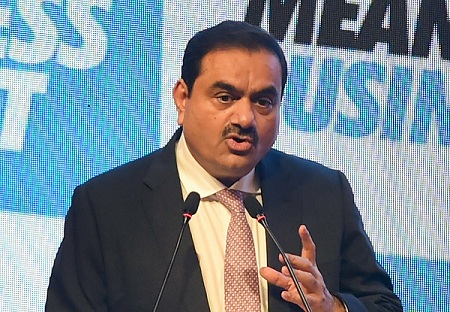Gautam Adani details green elements of Rs 7 lakh cr investment planned across verticals

New Delhi: Adani group will spend Rs 7 lakh crore in capital expenditure over the next 10 years and its billionaire chairman Gautam Adani has shared some details of the plans which will further consolidate the conglomerate’s position as infrastructure leader in India.
Adani in posts on X, formerly Twitter, has over the last few days detailed ‘green’ initiatives of the investment plan across some verticals of the apples-to-airport conglomerate.
“The portfolio recently announced its plan to invest over Rs 7 lakh crore over the next 10 years to consolidate its preeminent position as the largest infrastructure player in India,” Adani Energy Solutions said in a stock exchange filing.
While flagship Adani Enterprises Ltd incubates and develops new businesses spanning mining, airports, defence and aerospace, solar manufacturing, road, metro and rail, data centres and resource management, its ports business is on a greening drive.
“By 2025, we will set a national benchmark being the only carbon-neutral port operations and be net zero for APSEZ by 2040. Our climate-friendly transformation, includes electrifying all cranes, switching all diesel-based internal transfer vehicles to battery-based ITVs, and installing an additional 1000 MWof captive renewable capacity,” Adani said in a post on X.
Adani Ports and Special Economic Zone is the nation’s largest seaport operator in the country, with ports on both east and west coasts.
“Our dedication to protecting the environment is also reflected in our expanding mangrove plantations, aiming for a remarkable 5000 hectares by FY 25.
This is yet another step towards a greener future and further testament of our commitment to climate stewardship,” he said.
This is alongside the fast-expanding renewable energy business. Sharing pictures of the massive construction work in Kuch desserts in Gujarat, Adani said his group is building “the world’s largest green energy park”.
“This monumental project, covering 726 sq km in the challenging Rann desert, is visible even from space. We will generate 30GW to power over 20 million homes. Also, just 150 km away, in our Karmabhoomi Mundra, we are creating one of the globe’s most extensive and integrated renewable energy manufacturing ecosystems for solar and wind,” he said.
“This marks a significant milestone in India’s journey towards sustainable energy, underlining our commitment to the Solar Alliance and the Atmanirbhar initiative.”
Continuing on the green business, he said Adani Total Gas Ltd – the group’s city gas firm – is on a “massive expansion” with “CNG and piped natural gas, compressed biogas, and e-mobility.
ATGL retails CNG to automobiles and piped natural gas to households for cooking and industries across several cities in the country. Alongside this, is setting up electric vehicle (EV) charging stations as well as building plants that will turn agri waste into gas that can be used in city gas operations.
“We are on target for installing 75,000 EV charging stations by 2030. All of our own 50 sites are now powered by rooftop solar panels. vehicle fleet, covering 37 million km yearly, completely switched from diesel to CNG,” Adani said.
Adani group has in recent years ventured into newer businesses including data centres, cement, telecom and media.
It ventured into the airport in 2019, after it won operation and management contracts for six airports of Ahmedabad, Lucknow, Mangaluru, Jaipur, Guwahati and Thiruvananthapuram. Besides, it holds 73 per cent of Mumbai International Airport Ltd, which, in turn, holds 74 per cent of Navi Mumbai International Airport Ltd.
“Adani’s #MumbaiAirport is redefining excellence in aviation! It’s now the best in Asia Pacific for Services according to ASQ, in the 40 million+ passenger category,” the chairman said in a separate post.
With the feat of handling 1,032 flights in a single day on one runway, the airport is also leading in sustainability.
“We proudly operate on 100 per cent green energy, making us an entirely sustainable airport. Moreover, we are 3rd in Asia Pacific to reach Level 4+ ‘Transition’ of ACA Program of ACI, aligning our CO2 management with global climate objectives. Our next goal? Net Zero Carbon Emissions by 2029!” he added.




